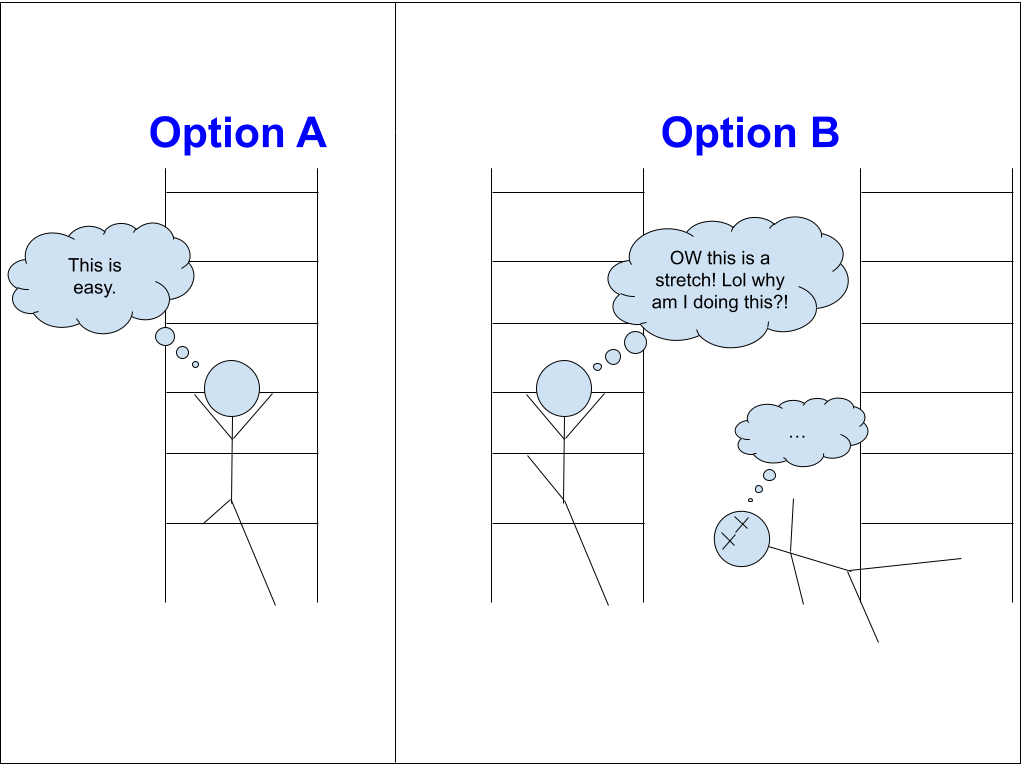Have an idea? Start.
Many of us tend to overanalyze new ideas to the point of killing them. The problem with this is that the idea may have had serious unknown potential had it been acted on, but that chance wasn’t taken, so the world will never know.
In his tweet, Andrew Kirby mentions the importance of focusing on step 1, rather than steps 2 through 100.
The reason this is so critical is because you’re not the same person after step 1 as you were before step 1.
By simply taking the very first step of whatever action is necessary for your new idea, you learn what step 2 involves.
Lesson learned: When you feel a wave of inspiration, ride it.
— Skylar Hinrichs 🏔️ (@Reach4TheSkylr) December 13, 2021
Don't wait for New Year's Day – just start. pic.twitter.com/nZKQqvARJA
If you’re like me, when you have an idea come to mind, your mind starts racing, thinking about how it scales, what life will be like if you pursue that idea, and if it’s a business idea, what it would be like to interact with the customers who would buy such a thing.
This can be inspiring.
By visualizing where you can take an idea, you’re more likely to get it there.
But it can be equally crippling.
By thinking about the entire idea at once, you’re putting a lot of pressure on yourself to get there.
You’re also putting too much pressure on your present self to do (or think about doing) work that future you will be doing.
Don’t get me wrong. It can certainly pay to think about strategy and longer-term decisions while coming up with an idea, but only to a healthy degree.
I’ve learned the hard way that too much time spent on future details can cause either:
- Information overload; or
- Second-guessing yourself.
After thinking through what an idea will take to come to fruition, you may be intimidated by the type of work that needs to be done and think “I have no idea how to do that”.
But you’ll figure that part out when you get there! You always do.
Think about the last time you encountered a new problem, the solution of which didn’t automatically come to you at the time.
Did you give up?
Or did you Google it and figure it out?
One of the great things about people like us who come up with ideas and act on them is that doing so expands our worldview in so many intangible ways.
Oftentimes, if a person starts with step 1 and finishes the project on step 100, they not only learn how to do the project and see this idea through to fruition, but they also learn how to do steps 1 through 100 in the process.
That’s a lot of newfound knowledge.
If you’re a founder of a company and you’ve created your product, your next step is to start getting in front of potential customers.
Even if you have no idea what you’re doing in the marketing or sales worlds, you know you’re going to take the time to learn how to do it.
We have an information superhighway in our pockets, just waiting for us to type what we want to learn.
We can learn anything for free.

In her book titled ‘Bird by Bird’, Anne Lamott explains that every good piece of writing begins with a ‘shitty first draft’.
Knowing this inspires Anne to get her thoughts on paper right away, fully knowing that it’s not going to be publishable right away and that she’ll likely cringe while reading through it.
The key is to edit.
To iterate.
To improve as we go.
For example, this is my first blog post that I’ve written in a long time and I needed a graphic to accurately convey the message I’m trying to explain.
Should I put the blog post writing process on hold to take a graphic design course and learn the ins and outs of creating a captivating graphic?
Nah, stick figures got the job done – wouldn’t you agree?
By just starting and focusing on what is in front of me, I’m able to share my thoughts with the world in an effective way.
Is it perfect?
Nope, far from it.
Once you’ve bought into an idea, focus on the first step.
Once that step is complete, focus on the next step.
Build this habit and eventually, you’ll be at step 100.
Is your goal to write a book? Write one page.
Is your goal to ride 2,000 miles on your bike next year? Start by riding one mile.
In any case, stop consuming and start taking action.

